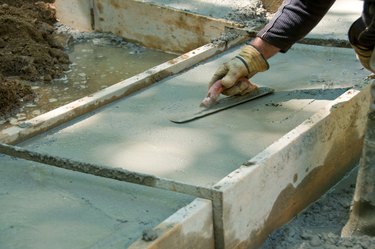
Concrete is a common building material for floors and walls because of its strength and durability. These qualities also affect the way in which it absorbs certain things, like moisture, sound, shock and energy. You must factor in concrete's absorbancy before including it in your building plans to make sure its qualities are consistent with your project's requirements, whether using it indoors or outside.
Water Absorbancy
Video of the Day
Concrete absorbs water, particularly if it is a slab on moist soil or if there is a leaky pipe embedded in the concrete. Water also comes from condensation or from rainfall if the concrete slab is outside. If the concrete is exposed to moisture regularly or to a large amount of water all at once, the liquid stays on the surface rather than getting readily absorbed because the area gets saturated. This standing water causes issues like musty smells, mildew and mold over time. High-quality concrete is more resistant to absorbing and retaining water, according to the Iowa State University Extension. Moisture barriers like insulation also prevent water absorption issues.
Video of the Day
Energy Absorbancy
Concrete is a solid substance that does not absorb much energy, unlike more giving materials like wood or foam. This quality makes it a bad choice in places where breakable objects or people are likely to strike the surface. You open yourself up to lawsuits if you use concrete flooring where people might fall and sustain injuries from hitting the unyielding surface, Stagestep Flooring Solutions warns. Add energy absorbancy to the concrete surface with a covering of foam, wood, woven material or another covering that cushions some of the impact.
Shock Absorbancy
Concrete is not an ideal material for floors on which people spend the majority of their time, either in a home or workplace, because of its lack of shock absorbancy. Solid concrete absorbs little or no shock when you stand on it or walk across it. Your body absorbs the shock instead, eventually causing pain and fatigue. Continued exposure often leads to injury. This quality makes concrete ideal for places where strong flooring is needed, like storage areas and garages, but bad for living spaces in homes or places where physical activity is common, like exercise rooms.
Sound Absorbancy
Concrete absorbs sound and blocks its transmission so well that it is often used for sound-barrier walls like those that shield homes along expressways from the roadway noise. Concrete also works as an efficient sound block in homes because it is too heavy to transmit airborne noise through the vibration caused by the sounds, according to Cement Concrete & Aggregates Australia. Concrete's mass effectively absorbs sounds caused by impact, like someone hitting one side of a wall, without transmitting them to the other side.